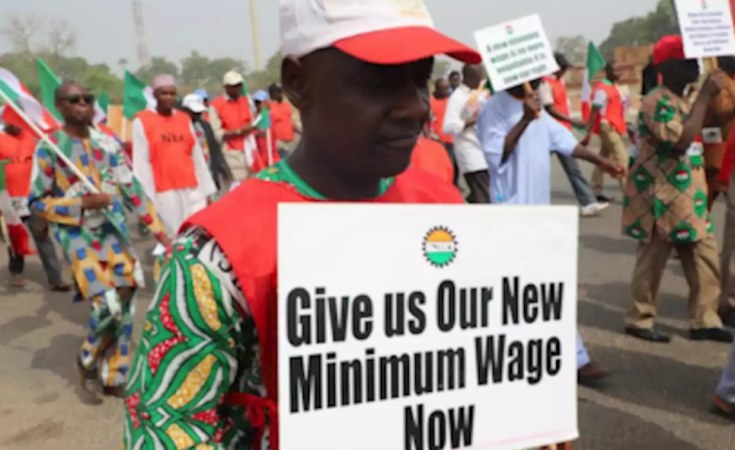Nigerian unions have suspended a nationwide strike to allow for more wage talks with the government after their protests brought Nigeria to its knees, disrupting flights and shutting down the national power grid.
Nigeria's largest trade unions, the Nigeria Labor Congress (NLC) and Trade Union Congress (TUC) on Tuesday suspended nationwide industrial action for a week to allow consultations with the government.
Workers are calling for a higher minimum wage amid Nigeria's worst cost of living crisis in a generation, with double-digit inflation leaving many Nigerians struggling to afford food.
The unions had called the indefinite strike on Monday which led to airports not operating, the shutdown of the national power grid and the closure of public offices and schools.
Clock ticking
Tayo Aboyeji, an NLC secretary stated that "failure on the part of the government to conclude with labor within one week shall prompt the organized labor to resume the strike without further notice."
This is the fourth protest by the unions since Nigerian President Bola Tinubu took office in May last year expressing frustration over some of his reforms such as fuel subsidies, electricity hikes, and the unstable naira currency.
The unions demand a minimum monthly wage of 494,000 naira (around $330 or €300), up from the current 30,000 naira a month.
The government said late on Monday it was "committed to a national minimum wage that is higher than N60,000" and that the two sides would meet "every day for the next week" in order to reach a deal.
Wage hike would 'cripple' Nigeria's economy
Nigerian Minister of Information Mohammed Idris said in a statement that the current proposal for a wage hike would translate into an annual wage bill of 9.5 trillion naira for Nigeria's federal government.
"This is apart from its cost implications for subnational governments and private sector employees. Such a wage bill would cripple the Nigerian economy by leading to massive job losses, especially in the private sector," Idris said.
The government said they would continue to engage "in the context of these negotiations on behalf of the Nigerian people."
However, Dr. John Markus Ayuba, a former bank executive and former commissioner of finance in Nigeria's Kaduna State, told DW that the government's offer to the union is not enough for an average Nigerian to live by.
"The amount is way below what the average Nigerian requires to live well in this country, because I live in Nigeria and I know what it means," Ayuba said.
Ayuba added that if the unions accept this amount based on whatever arguments the government gives them, "They shouldn't even have started the strike if they were going to accept 60,000 naira as as the minimum wage."
Nigerians are 'fed up'
Roselyuba Anara, a member of the administration of the Nigeria Labour Council, told DW that the strike had long been in the making.
"The people are fed up. The suffering is too much, the hunger is too much, and the inflation is biting," she said, adding that the naira is useless as "prices, cost of food in the markets is so high that poverty has escalated."
Anara said Tinubu brought down the economy from the day he was sworn into government in May 2023 when he announced that fuel subsidies would be removed.
Tinubu's decision to abruptly end the subsidies led to a doubling of gasoline prices, rising food and transport costs and an increase in the price of imported products.
"How can you remove the first subsidy without preparing the people, without consultation [...] what concerns the marketwomen who sell pepper and tomatoes with the dollar?" Anara said. "It concerns her because if she sells her tomato for one naira that one naira cannot buy her food. That one naira cannot pay her transport, that one naira cannot buy her medication or even take care of her children then is useless."
Since taking office, Tinubu embarked on a bold set of economic reforms, which he argued were necessary and would bear fruit in the future.
However, the reforms, coupled with macroeconomic impacts following the COVID pandemic and amid Russia's war in Ukraine, have put additional upward pressure on inflation, which rose to an almost 30-year high of more than 30% this year.
Tinubu has shown himself as somebody who is the masses but what is happening at the moment is "a litmus test for us to see what happens in this instance," Dr. John Markus Ayuba told DW.
He also called the government that if sacrifices are to be made, it should be across the board including those in government.
"There have been persistent complaints about what the National Assembly members, the senators and the members of the House of Representatives are earning, nobody has attended to that rather," Ayuba said.
Edited by: Keith Walker


